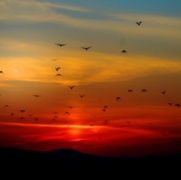Cornwall's Nature Recovery Strategy
Mark Holmes, Head of Environmental Partnerships and Climate Change, Cornwall Council, discusses how the Council’s nationally recognised response to biodiversity loss is leading the way for Local Nature Recovery Strategies across the UK.
In November 2022, the Council became one of the first local authorities to declare an ecological emergency, recognising the urgent need for action to bend the curve of nature decline in the region. This combined with our 2019 Climate Emergency declaration acknowledges the challenges our environment faces and the need for a systems-wide response to help reduce carbon, adapt to a changing climate and grow nature.
Cornwall and Isles of Scilly Local Nature Recovery Strategy
A Local Nature Recovery Strategy (LNRS) is a spatial strategy providing a blueprint to focus action for nature. It is a statutory requirement of the 2021 Environment Act and contributes to national efforts to halt species decline. We are also using this process to support our local ambition for at least 30% of land, rivers and seas in Cornwall and the Isles of Scilly to be protected and well-managed for nature by 2030.
As one of five pilot areas nationally to deliver a draft Local Nature Recovery Strategy, Cornwall Council is now well-placed as one of the 47 Responsible Authorities across the UK to develop the new strategy.
Our approach
Cornwall Council work closely with the Council of the Isles of Scilly and Natural England who are the Supporting Authorities for LNRS development, helping to guide and shape it. With the Cornwall and Isles of Scilly Local Nature Partnership and representatives from our National Landscapes acting as the Steering Group. The Board brings representation from key partners including the local Wildlife Trusts, The National Trust, the University of Exeter and the University of Plymouth, and key sectors including farmers and landowners.
The steering group agreed on six guiding principles to help shape the LNRS, in that it should:
- Prioritise nature but support wider environmental benefits.
- Build upon progress to date with a high level of ambition.
- Be deliverable over perfect.
- Emphasise collaboration and co-production where possible.
- Create one strategy that is useful for the whole region.
- Embed marine considerations through a Voluntary Marine Extension.
Emphasising the need for a voluntary extension of the LNRS was seen as vital for a region surrounded by hundreds of miles of coastland and separated by 30 miles of open water.
Developing the strategy through engagement and intelligence:
In developing the LNRS, we wanted to understand what, where and how nature can be recovered which required knowledge and engagement from a range of sources including the local community and regional experts.
In Summer 2023, we launched an initial consultation aimed at key sectors and the wider public and received over 2,700 engagements through in-person and online responses. Analysis helped identify key themes from this engagement and priorities, and we will now work with local experts, delivery partners and landowners to refine these themes into a set of priorities ready for consultation.
In addition, Cornwall Council is working with the University of Exeter to create our nature recovery opportunity maps to identify where we can make nature bigger, better and more joined up. To do this the University are taking a species-led conservation planning approach. They have engaged with local taxonomic and species experts to help inform which wildlife and habitats to focus on and are developing prototype maps to use in engagement exercises before developing the final mapping.
Facilitating LNRS delivery
Whilst Cornwall Council are the Responsible Authority developing the LNRS, from the outset we were clear the LNRS will not be delivered by the council alone and we are working with partners to embed the strategy in their ways of working.
For example, Cornwall’s National Landscapes team have been using the foundations of the LNRS to help projects under the Farming in Protected Landscapes (FiPL) fund define their goals and ambitions, score project proposals and help steer project development. This fund is designed for farmers and land managers to enable projects that support nature recovery, mitigate climate change impacts and help audiences discover, enjoy and understand the landscape.
That said, we are leading a number of initiatives which enable LNRS delivery at both the landscape and community scale including the Forest for Cornwall, Making Space for Sand, Urban Greenshoots and the Climate and Nature Fund.
The Council have also been working on the Local Investment in Nature Cornwall (LINC) programme. LINC is a national pilot which aims to create a framework to enable private investment in nature. The Council was awarded £1m of revenue funding by Defra to identify mechanisms that pave the way for more investment in nature across Cornwall and the Isles of Scilly.
The LNRS aims to bring together an approach for nature recovery, coordinating existing strategies and providing a blueprint for action. By working with existing partners, new collaborations, creating innovative funding mechanisms and building on technological advances, we are well on the way to delivering a strategy to help coordinate action for nature across the region.
For more information, please contact [email protected].


.png)



.png)